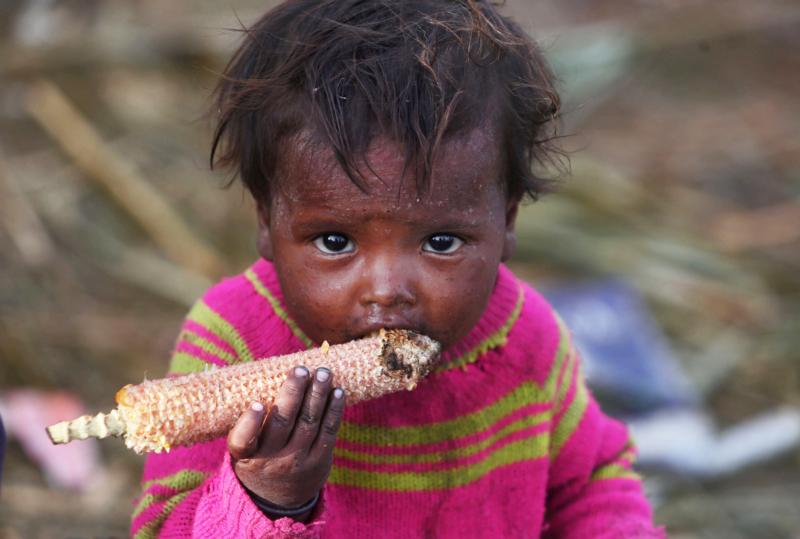
A child eats corn outside a makeshift shelter in 2015 in Kashmir, India. The Catholic Church agency Caritas has launched a project that aims to end hunger across South Asia by 2030. (CNS photo/Farooq Khan, EPA)
NEW DELHI, India (CNS) — The Catholic Church agency Caritas has launched a project that aims to end hunger across South Asia by 2030.
Caritas India introduced the program in collaboration with its international partners to help farmers adapt methods to cope with erratic climate conditions, ucanews.com reported.
“Climate change is a global challenge and affects agricultural production and human well-being. It hits hardest where people directly depend on agriculture for food and livelihoods,” said Sunil Simon, project director in India.
[hotblock]
The Smallholder Adaptive Farming and Biodiversity Network was launched in June during Caritas Asia’s regional conference in Bangkok.
“The unique program aims to address our common goal of ending hunger by 2030,” said Christoph Schweifer, secretary general of Caritas Austria, a partner in the project.
Caritas organizations in Bangladesh, Nepal and Pakistan will implement the program with the support of Caritas Austria and Caritas Switzerland.
The effort aims to fight hunger and malnutrition by promoting local food through small-scale farming in selected areas of South Asia in response to climate change, Simon said.
The program will contribute to achieving the United Nations Sustainable Development Goal to end hunger, achieve food security and improved nutrition and promote sustainable agriculture in South Asia.
While 40 percent of the global population is employed in the agriculture sector, 54.6 percent of India’s 1.2 billion people are farmers, according to U.N. studies. Although more than half of Indians are farmers, agriculture contributes only 15 percent of the country’s gross domestic product.
[tower]
India has nearly 191 million hungry people — 25 percent of the world’s total — who do not have a complete meal each day, said the U.N.’s 2017 report on the state of food security and nutrition.
About 51 percent of Indian women of child-bearing age are anemic because of a lack of a balanced diet, while 38 percent of Indian children have stunted growth for want of nutritious food, the report said.
The project aims to create a network of farmers to discuss their environment, climate and agrarian economy to pinpoint their specific problems. They will then identify locally acceptable solutions and test them to arrive at the best solution for growing crops.
“Mutual sharing, learning and proactive problem solving between farmers, agricultural scientists and governmental and non-governmental organizations are at the core of this project,” Simon said.
The five-year project aims to benefit 10,000 farmers in India and 40,000 across South Asia before concluding in 2022, he said.
Father Paul Moonjely, Caritas India executive director, said small farmers are crucial in achieving the nation’s food and nutritional security goals.
PREVIOUS: Comparing the attempts to legalize abortion in Ireland and Argentina
NEXT: Canon lawyers explain how Vatican abuse trials function



Share this story